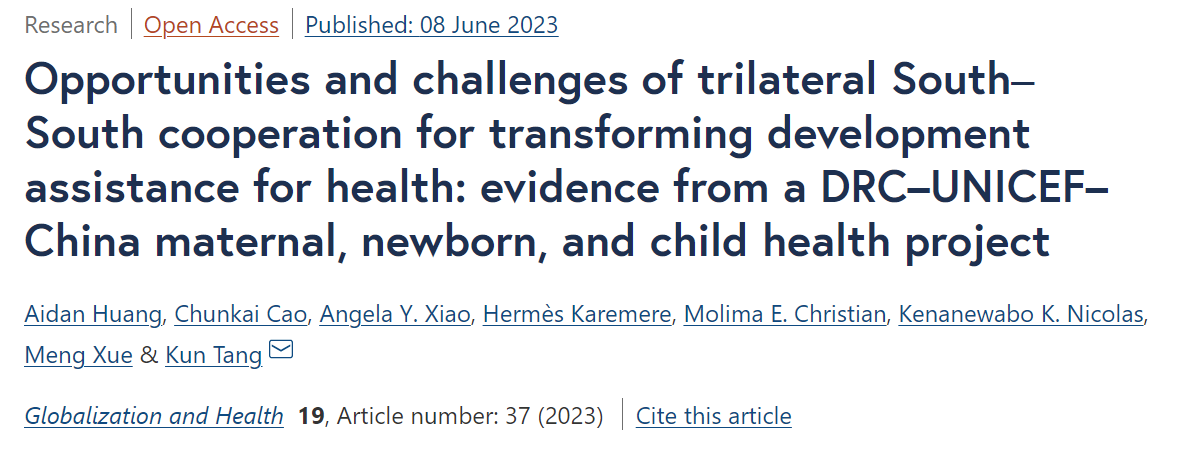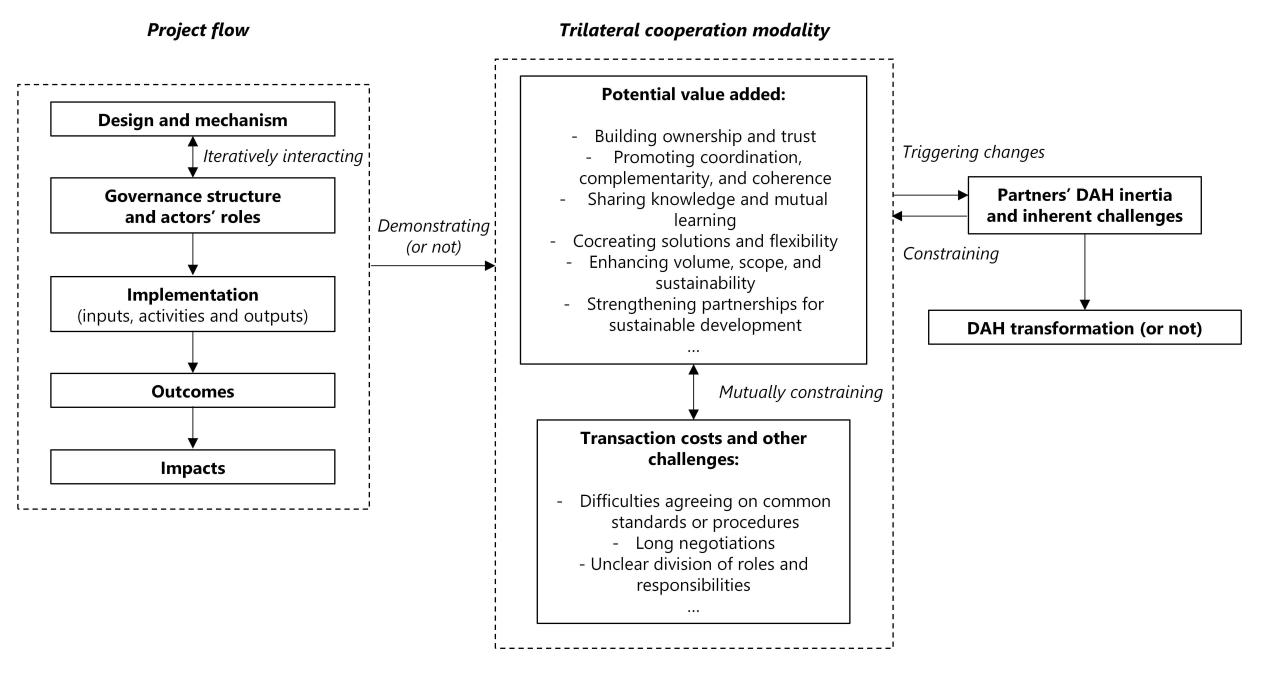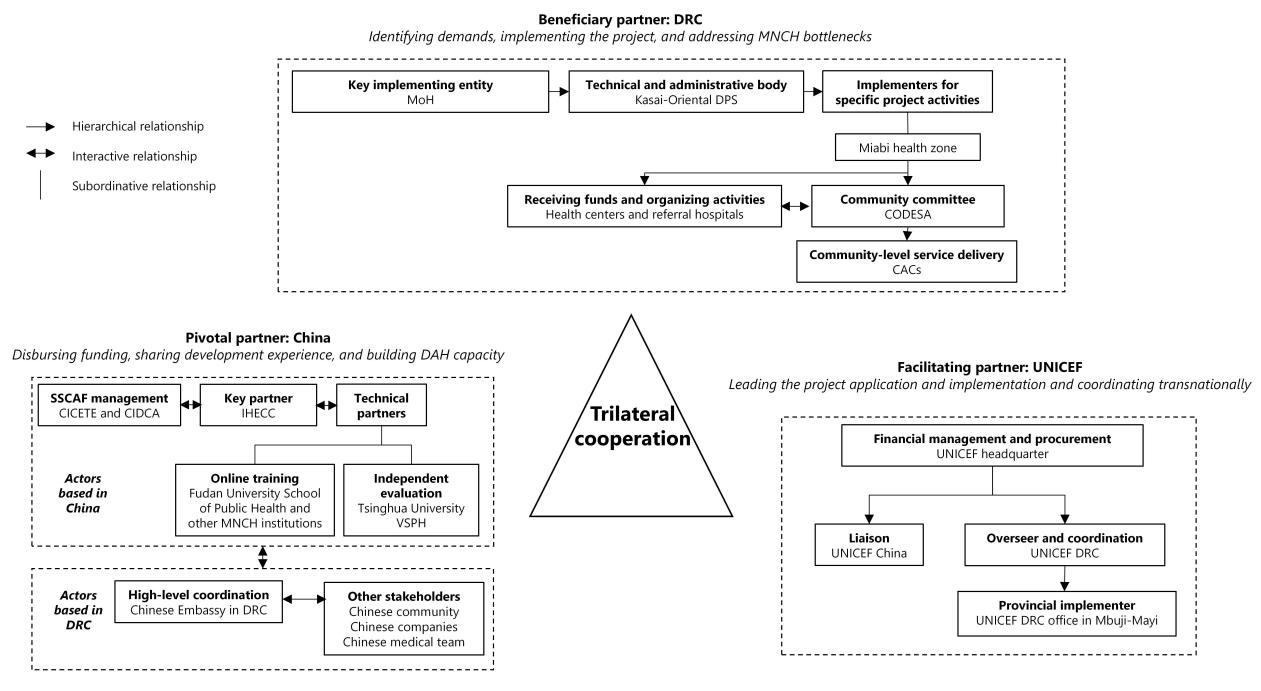
近日,清华大学万科公共卫生与健康学院副教授唐昆团队与刚果金布卡武天主教大学(Université Catholique de Bukavu)在《全球化与健康》(Globalization and Health)发表了题为《南南三方合作推动卫生发展援助转型的机遇与挑战:基于刚果金—联合国儿童基金会—中国妇幼健康项目的证据》(Opportunities and challenges of trilateral South‒South cooperation for transforming development assistance for health: evidence from a DRC–UNICEF–China maternal, newborn, and child health project)的文章。研究成果旨在推动包括中国在内的新兴发展伙伴通过新型伙伴关系促进全球健康与良好福祉的可持续。
问题提出
研究基于“南南合作与三方合作”为主题的简要范围综述,提出“南南三方合作是否以及如何推动卫生发展援助转型”这一尚未被充分探究的研究问题。已有文献认为南南三方合作是一种新兴发展合作模式,能够变革当前西方主导的全球卫生发展援助格局,使卫生发展合作关系更加平等。中国作为卫生发展援助的新兴发展伙伴,其传统援外模式正面临国内外舆论及可持续问题等诸多挑战,而三方合作或能成为转型契机。然而,三方合作意味着更高昂的交易成本和复杂的治理架构。三方合作与双边合作相比,能否带来更多附加值,推动卫生发展援助转型?
研究方法
研究以刚果金、联合国儿童基金会和中国在刚果金的一个妇幼健康项目为案例。数据来源为项目文件和报告,以及覆盖多方视角、涉及22名利益相关者的访谈。研究结合经合组织(OECD)“三方合作”分析框架及卫生发展援助项目逻辑模型,开发了“南南三方合作与卫生发展援助转型分析框架”,以展开定性分析。

研究提出了南南三方合作与卫生发展援助转型的分析框架
研究发现
以中国为例的新兴发展伙伴依托多边机构开展三方合作,将有机会(1)使卫生服务递送以需求为导向、基于本土情境,并与当地卫生体系一致;(2)协调各方国际发展合作项目的规范与程序,建立各方相互学习的机制;(3)提升新兴发展伙伴作为发展经验传递者的全球知名度。案例也揭示了诸多挑战。例如,复杂治理架构下核心利益相关者易被忽视,新兴发展伙伴若过度依赖多边机构执行项目则难以深入项目当地。此外,三方合作高昂交易成本也可能挤占卫生服务递送的资源。

与以往研究相比,研究依托一手经验证据,更深入地剖析了中国参与三方合作中的利益相关者
研究启示
以南南三方合作推动卫生发展转型,需要加强受益伙伴(beneficiary partner)的发展自主性,并使关键伙伴(pivotal partner,在此案例中为中国)更多参与到项目中来,以使其深入了解当地情境及需求。即使在短期试点项目中,也应以目标受益者的健康与良好福祉为核心,保证足够的资源来支持卫生服务递送。
原文摘要
Abstract
Background
Trilateral South‒South cooperation is envisioned as an equal and empowering partnership model but still faces certain challenges. This study addresses whether and how trilateral South‒South cooperation can transform traditional development assistance for health (DAH) and explores the opportunities and challenges of trilateral South‒South cooperation for transforming future DAH, in the theme of “the emerging development partner’s DAH transformation facilitated by a multilateral organization”.
Methods
We evaluate a maternal, newborn, and child health (MNCH) project involving the Democratic Republic of Congo (DRC), the United Nations Children’s Fund (UNICEF), and China (hereinafter referred to as the “DRC–UNICEF–China project”). We analyze data from project documents and seventeen semi-structured interviews using a pragmatic analytical framework based on the DAH program logic model and the OECD’s trilateral cooperation framework.
Results
Evidence from the DRC–UNICEF–China MNCH project suggests that trilateral South‒South cooperation facilitated by a multilateral organization can provide transformative opportunities for emerging development partners’ DAH to generate and deliver context-based, demand-oriented solutions, harmonize rules and procedures, institutionalize mutual learning and knowledge sharing, and increase the visibility of emerging development partners as sources for South‒South development experience transfer. However, the project revealed some challenges, including the neglect of key stakeholders in the complex governance structure, the high transaction costs needed to ensure transparency, and the harm local absence of the emerging development partner poses to long-term DAH engagement.
Conclusions
This study echoes some of the findings in trilateral SSC literature that claim power structures and philanthropic, normative justification for health equity are often juxtaposed in trilateral SSC partnerships. The opportunities offered by the DRC–UNICEF–China project align with China’s cognitive learning process for strengthening international engagement and global image building. However, challenges may arise as a result of complex governance structures and the entrustment of facilitating partners, which can threaten the effectiveness of trilateral cooperation. We call for strengthening the beneficiary partner’s ownership at all levels, engaging the emerging development partner to better understand the beneficiary partner’s local context(s) and needs, and ensuring available resources to support programmatic activities and long-term partnerships for the health and well-being of the beneficiaries.